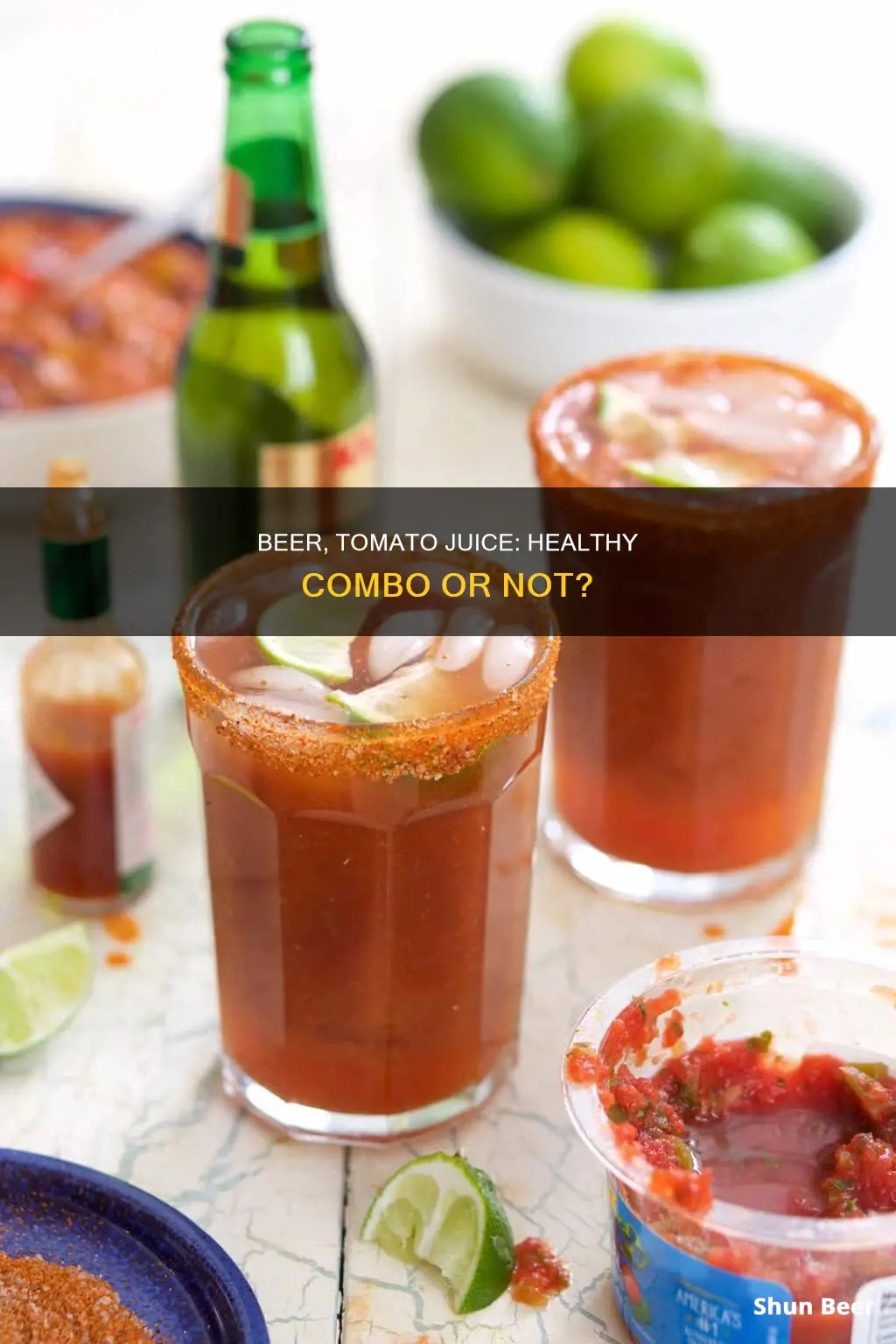
Beer with tomato juice, also known as red beer, is a popular drink in the Midwest and Mexico. While beer and tomato juice each have their own benefits, such as vitamin C and lycopene in tomato juice, and magnesium and phosphorus in beer, there are also potential risks to consider. For example, beer can lead to increased blood pressure and depression, while tomato juice can contain high amounts of salt. So, is beer and tomato juice healthy? Well, that depends on a number of factors, including how much you drink and your general health.
What You'll Learn

Beer and tomato juice contain vitamins and minerals
Beer and tomato juice are both sources of vitamins and minerals. Tomato juice is loaded with vitamins, minerals, and antioxidants. It is particularly rich in lycopene, a powerful antioxidant with many health benefits. It is also a good source of vitamin C, vitamin A, B vitamins, potassium, and magnesium.
Beer, on the other hand, is not typically known for its nutritional value. However, it does contain small amounts of vitamins and minerals. According to the book "Beer and Health", beer can contain small amounts of fibre, B vitamins, silicon, and other minerals.
When combined, beer and tomato juice can make a refreshing cocktail known as a "red beer" or "Michelada". This cocktail is often made with tomato juice, beer, lime juice, Worcestershire sauce, and hot sauce. While it is not a typical health drink, it can be a healthier option compared to other cocktails, as it contains a healthy amount of vitamin C from the tomato juice.
Overall, while beer and tomato juice may not be considered a super healthy combination, they do contribute some vitamins and minerals to your diet.
Bloody Mary vs Beer: Which Booze is Healthier?
You may want to see also

Excess consumption can lead to health issues
While drinking beer with tomato juice may offer some health benefits, excessive consumption can lead to health issues. Both beverages provide certain nutrients and benefits when consumed in moderation, but it is crucial to understand their potential risks to maintain a healthy balance.
Beer is a good source of magnesium, phosphorus, and B vitamins, and it can help reduce the risk of kidney stones. It also has anti-inflammatory properties and can positively impact cholesterol levels. However, drinking too much beer can lead to increased blood pressure, depression, and an elevated risk of developing type 2 diabetes and various cancers. Beer is rich in carbohydrates, which can cause a spike in blood sugar levels when consumed in large amounts. Additionally, the high alcohol content in beer can lead to dehydration, liver damage, and an increased risk of accidents and injuries.
On the other hand, tomato juice is packed with vitamin C, potassium, and lycopene, offering potential protection against cancer and supporting heart health. However, tomato juice can contain high amounts of salt, sugar, and sodium, leading to health problems such as high blood pressure, weight gain, and stomach pain when consumed in excess.
When combined, beer and tomato juice create a refreshing cocktail often called "red beer" or a "Michelada." While this drink may be a healthier alternative to straight beer due to its lower alcohol content, it is important to remember that excessive consumption of any alcoholic beverage can lead to negative health consequences.
To maintain a healthy relationship with beer and tomato juice, it is crucial to practise moderation and always consult with a healthcare professional for personalised advice regarding your diet and alcohol intake.
Mead vs Beer: Which Is Healthier?
You may want to see also

Tomato juice is high in lycopene
The health benefits of lycopene are promising. It may help lower the risk of stroke, prostate cancer, and metabolic diseases. It is also one of the most potent antioxidants among dietary carotenoids.
In a 2015 study, 25 healthy young women were given 9 ounces of tomato juice every day for two months. The study found that tomato juice was linked to higher levels of lycopene and lower body weight, body fat, BMI, and cholesterol blood levels. Another study by Gity Sotoudeh of Tehran University of Medical Sciences found that tomato juice reduces oxidative stress in overweight women.
The bioavailability of lycopene is affected by a number of factors, including food processing and dietary composition. Consuming lycopene with fat increases its bioavailability. For example, consuming salads with full-fat dressing results in higher blood carotenoid levels than eating salads with reduced-fat dressing.
Lycopene is found in the highest concentrations in the liver, testes, adrenal glands, and adipose tissues. It is also found in lower concentrations in the kidney, ovary, lung, and prostate.
Drinking Beer in Moderation: How Much Is Too Much?
You may want to see also

Beer can help reduce inflammation
Beer is often viewed as a guilty pleasure, but when consumed in moderation, it can offer several potential health benefits. One of these benefits is its ability to help reduce inflammation in the body.
Inflammation is the underlying cause of many diseases, and according to a study published in Molecular Nutrition & Food Research, hops, an essential ingredient in beer, possess anti-inflammatory properties. The researchers compared the anti-inflammatory effects of different hops varieties and discovered that consuming hops in beer form interfered with inflammation-causing compounds.
Additionally, non-alcoholic beer has been found to provide similar anti-inflammatory benefits. A randomized controlled trial published in Med Sci Sports Exerc investigated the effects of non-alcoholic beer on healthy male runners. The results indicated that consuming 1-1.5 litres of non-alcoholic beer per day for 3 weeks before and 2 weeks after a marathon reduced post-race inflammation and the incidence of upper respiratory tract illnesses.
The anti-inflammatory properties of beer may also contribute to a reduced risk of developing rheumatoid arthritis (RA). According to Karen Costenbader, a rheumatologist at Brigham and Women's Hospital in Boston, moderate alcohol consumption lowers biomarkers of inflammation, including c-reactive protein (CRP), interleukin-6, and TNF-alpha receptor 2.
While beer can have anti-inflammatory effects, it's important to consume it in moderation. Excessive alcohol consumption can have negative health consequences, and it may interact negatively with certain medications, especially those prescribed for arthritis or gout. As always, it's best to consult with a healthcare professional to determine if beer consumption is safe and appropriate for your individual circumstances.
The Pros and Cons of IPA Beer Consumption
You may want to see also

Tomato juice can help lower the risk of cancer
Tomatoes are a great source of vitamins, minerals, antioxidants, and dietary fiber. They are also a major source of lycopene, a red-colored phytochemical and a type of carotenoid. Lycopene acts as an antioxidant, stimulating the body's own antioxidant defenses and decreasing free radical damage to DNA that can lead to cancer.
In addition to lycopene, tomatoes also contain beta-carotene, which promotes cell-to-cell communication and helps control cell growth. Beta-carotene is used by the body to form vitamin A, which helps protect against cancer through the immune system and the expression of genes that regulate cell growth.
Research has shown that consuming tomatoes can help lower the risk of various types of cancer, including colorectal, prostate, and breast cancer. One study found that a higher intake of tomato salsa was associated with a lower risk of colorectal cancer, suggesting that tomato salsa consumption has beneficial effects in terms of cancer prevention. Another study found that a diet high in tomatoes was associated with a reduced risk of prostate cancer, with lycopene playing a key role in preventing this type of cancer.
While drinking tomato juice can be a great way to get the health benefits of tomatoes, it is important to consume it in moderation. This is because the high sodium content in tomato juice can increase the risk of high blood pressure if consumed in large quantities.
Happy Dads, Healthy Beer: A Cheerful Toast
You may want to see also
Frequently asked questions
This cocktail is often called a "red beer", and is also known as a "red-eye", "red rooster", or "tomato beer". In Mexico, a similar cocktail is called a "michelada".
Beer is a source of magnesium, phosphorus, and B vitamins, and can help reduce the risk of kidney stones. Tomato juice is high in vitamin C, potassium, and lycopene, which can help lower your risk of cancer and improve your heart health.
Both drinks can be unhealthy in large quantities. Beer can lead to increased blood pressure, depression, and an increased risk of developing type 2 diabetes and certain types of cancer. Tomato juice can contain high amounts of salt, which can also lead to high blood pressure if consumed in excess.
To make this cocktail healthier, reduce the amount of beer used, and use fresh tomato juice instead of bottled or carton juice, as many brands contain added salt and sugar.







